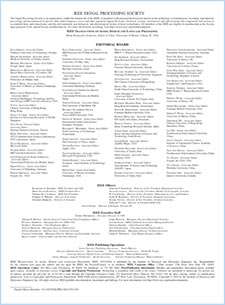- Our Story
- Publications & Resources
- Publications & Resources
- Publications
- IEEE Signal Processing Magazine
- IEEE Journal of Selected Topics in Signal Processing
- IEEE Signal Processing Letters
- IEEE Transactions on Computational Imaging
- IEEE Transactions on Image Processing
- IEEE Transactions on Information Forensics and Security
- IEEE Transactions on Multimedia
- IEEE Transactions on Signal and Information Processing over Networks
- IEEE Transactions on Signal Processing
- IEEE TCI
- IEEE TSIPN
- Data & Challenges
- Submit Manuscript
- Guidelines
- Information for Authors
- Special Issue Deadlines
- Overview Articles
- Top Accessed Articles
- SPS Newsletter
- SigPort
- SPS Resource Center
- Publications FAQ
- Blog
- News
- Dataset Papers
- Conferences & Events
- Community & Involvement
- Professional Development
- For Volunteers
- Information for Authors-OJSP
-
Home
Conferences Events IEEE Signal Processing Magazine IEEE SPL Article IEEE TIFS Article IEEE TMM Article IEEE TSP Article Jobs in Signal Processing Lectures Machine Learning Seasonal Schools Signal Processing News SPM Article SPS Distinguished Lectures SPS Newsletter Article SPS Webinar SPS Webinars SPS Webinar Series Webinar webinars
-
Our Story
What is Signal Processing?

The technology we use, and even rely on, in our everyday lives –computers, radios, video, cell phones – is enabled by signal processing. Learn More » -
Publications & Resources
-
SPS Resources
- Signal Processing Magazine The premier publication of the society.
- SPS Newsletter Monthly updates in Signal Processing
- SPS Resource Center Online library of tutorials, lectures, and presentations.
- SigPort Online repository for reports, papers, and more.
- SPS Feed The latest news, events, and more from the world of Signal Processing.
-
SPS Resources
-
Conferences & Events
-
Community & Involvement
-
Membership
- Join SPS The IEEE Signal Processing Magazine, Conference, Discounts, Awards, Collaborations, and more!
- Chapter Locator Find your local chapter and connect with fellow industry professionals, academics and students
- Women in Signal Processing Networking and engagement opportunities for women across signal processing disciplines
- Students Scholarships, conference discounts, travel grants, SP Cup, VIP Cup, 5-MICC
- Young Professionals Career development opportunities, networking
- Get Involved
-
Technical Committees
- Applied Signal Processing Systems
- Audio and Acoustic Signal Processing
- Bio Imaging and Signal Processing
- Computational Imaging
- Image Video and Multidimensional Signal Processing
- Information Forensics and Security
- Machine Learning for Signal Processing
- Multimedia Signal Processing
- Sensor Array and Multichannel
- Signal Processing for Communication and Networking
- Signal Processing Theory and Methods
- Speech and Language Processing
- Technical Working Groups
- More TC Resources
-
Membership
-
Professional Development
-
Professional Development
- Micro Mentoring Experience Program (MiME)
- Distinguished Lecturer Program
- Distinguished Lecturers
- Distinguished Lecturer Nominations
- Past Lecturers
- Distinguished Industry Speaker Program
- Distinguished Industry Speakers
- Distinguished Industry Speaker Nominations
- Industry Resources
- IEEE Training Materials
- Jobs in Signal Processing: IEEE Job Site
-
Career Resources
- SPS Education Program Educational content in signal processing and related fields.
- Distinguished Lecturer Program Chapters have access to educators and authors in the fields of Signal Processing
- Job Opportunities Signal Processing and Technical Committee specific job opportunities
- Job Submission Form Employers may submit opportunities in the area of Signal Processing.
-
Professional Development
-
For Volunteers
-
For Board & Committee Members
- Board Agenda/Minutes* Agendas, minutes and supporting documentation for Board and Committee Members
- SPS Directory* Directory of volunteers, society and division directory for Board and Committee Members.
- Membership Development Reports* Insight into the Society’s month-over-month and year-over-year growths and declines for Board and Committee Members
-
For Board & Committee Members
Popular Pages
Today's:
- 2025 IEEE International Workshop on Computational Advances in Multi-Sensor Adaptive Processing (CAMSAP)
- Awards & Submit Award Nomination
- Information for Authors
- IEEE JSTSP Special Issue on High-Dimensional Imaging: Emerging Challenges and Advances in Reconstruction and Restoration
- Membership
- (ASRU 2025) 2025 IEEE Automatic Speech Recognition and Understanding Workshop
- Video & Image Processing Cup
- IEEE Transactions on Information Forensics and Security
- IEEE JSTSP Special Series on Artificial Intelligence for Smart Agriculture
- IEEE Signal Processing Letters
- Access Restricted
- SPS Scholarship Program
- IEEE Transactions on Multimedia
- IEEE Journal of Selected Topics in Signal Processing
- IEEE Transactions on Image Processing
All time:
- Information for Authors
- Submit a Manuscript
- IEEE Transactions on Image Processing
- IEEE Transactions on Information Forensics and Security
- IEEE Transactions on Multimedia
- IEEE Transactions on Audio, Speech and Language Processing
- IEEE Signal Processing Letters
- IEEE Transactions on Signal Processing
- Conferences & Events
- IEEE Journal of Selected Topics in Signal Processing
- Information for Authors-SPL
- Conference Call for Papers
- Signal Processing 101
- IEEE Signal Processing Magazine
- Guidelines
Last viewed:
- (ICASSP 2026) 2026 IEEE International Conference on Acoustics, Speech, and Signal Processing
- IEEE Signal Processing Letters
- Interview with Professor Shiv Dutt Joshi
- Awards & Submit Award Nomination
- Signal Processing 101
- (SiPS 2025) 2025 IEEE International Workshop on Signal Processing Systems
- Information for Authors
- IEEE Transactions on Multimedia
- IEEE JSTSP Special Series on Artificial Intelligence for Smart Agriculture
- IEEE JSTSP Special Issue on High-Dimensional Imaging: Emerging Challenges and Advances in Reconstruction and Restoration
- Submit a Manuscript
- Membership
- Editorial Board
- Publications Board
- IEEE SPM Special Issue on Artificial Intelligence for Education: A Signal Processing Perspective
Bayesian Learning for Deep Neural Network Adaptation
You are here
Publications & Resources
For Authors
Top Reasons to Join SPS Today!
1. IEEE Signal Processing Magazine
2. Signal Processing Digital Library*
3. Inside Signal Processing Newsletter
4. SPS Resource Center
5. Career advancement & recognition
6. Discounts on conferences and publications
7. Professional networking
8. Communities for students, young professionals, and women
9. Volunteer opportunities
10. Coming soon! PDH/CEU credits
Click here to learn more.
Bayesian Learning for Deep Neural Network Adaptation
A key task for speech recognition systems is to reduce the mismatch between training and evaluation data that is often attributable to speaker differences. Speaker adaptation techniques play a vital role to reduce the mismatch. Model-based speaker adaptation approaches often require sufficient amounts of target speaker data to ensure robustness. When the amount of speaker level data is limited, speaker adaptation is prone to overfitting and poor generalization. To address the issue, this paper proposes a full Bayesian learning based DNN speaker adaptation framework to model speaker-dependent (SD) parameter uncertainty given limited speaker specific adaptation data. This framework is investigated in three forms of model based DNN adaptation techniques: Bayesian learning of hidden unit contributions (BLHUC), Bayesian parameterized activation functions (BPAct), and Bayesian hidden unit bias vectors (BHUB). In the three methods, deterministic SD parameters are replaced by latent variable posterior distributions for each speaker, whose parameters are efficiently estimated using a variational inference based approach. Experiments conducted on 300-hour speed perturbed Switchboard corpus trained LF-MMI TDNN/CNN-TDNN systems suggest the proposed Bayesian adaptation approaches consistently outperform the deterministic adaptation on the NIST Hub5'00 and RT03 evaluation sets.
When using only the first five utterances from each speaker as adaptation data, significant word error rate reductions up to 1.4% absolute (7.2% relative) were obtained on the CallHome subset. The efficacy of the proposed Bayesian adaptation techniques is further demonstrated in a comparison against the state-of-the-art performance obtained on the same task using the most recent systems reported in the literature.
SPS Social Media
- IEEE SPS Facebook Page https://www.facebook.com/ieeeSPS
- IEEE SPS X Page https://x.com/IEEEsps
- IEEE SPS Instagram Page https://www.instagram.com/ieeesps/?hl=en
- IEEE SPS LinkedIn Page https://www.linkedin.com/company/ieeesps/
- IEEE SPS YouTube Channel https://www.youtube.com/ieeeSPS
Home | Sitemap | Contact | Accessibility | Nondiscrimination Policy | IEEE Ethics Reporting | IEEE Privacy Policy | Terms | Feedback
© Copyright 2025 IEEE - All rights reserved. Use of this website signifies your agreement to the IEEE Terms and Conditions.
A public charity, IEEE is the world's largest technical professional organization dedicated to advancing technology for the benefit of humanity.







